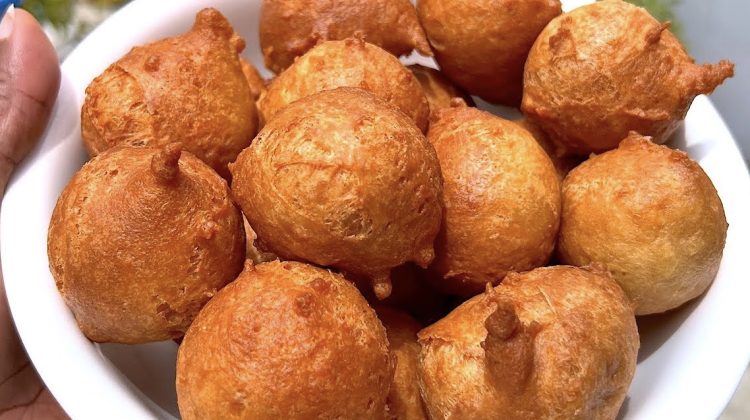
Nigerian cuisine is a treasure trove of delightful flavors and unique dishes, and one such tasty treat is Nigerian Buns. These golden, fluffy, and slightly sweet snacks are a favorite across Nigeria and are perfect for satisfying your cravings. In this beginner-friendly guide, we’ll walk you through the process of making Nigerian Buns, complete with easy-to-follow instructions and precise measurements.
Ingredients You’ll Need:
Before diving into the cooking process, let’s gather all the essential ingredients. Here’s what you’ll need to make these mouthwatering Nigerian Buns:
Dry Ingredients:
- 2 cups of all-purpose flour
- 1/2 cup of granulated sugar
- 1 teaspoon of baking powder
- A pinch of salt
- A pinch of nutmeg or vanilla extract (for flavor)
Wet Ingredients:
- 1/2 cup of whole milk
- 2 large eggs
- 2 tablespoons of melted butter or vegetable oil
Additional Ingredients:
- Vegetable oil for deep frying
- Powdered sugar for dusting (optional)
Now that you’ve gathered your ingredients, let’s get started on making these delicious Nigerian Buns!
Step 1: Preparation is Key
Begin by setting up your workspace. Make sure you have all your ingredients and tools ready. You’ll need a mixing bowl, a whisk or spoon for mixing, a deep fryer or a large, deep frying pan, and a slotted spoon for frying.
Step 2: Mixing the Dry Ingredients
In your mixing bowl, combine the dry ingredients: 2 cups of all-purpose flour, 1/2 cup of granulated sugar, 1 teaspoon of baking powder, a pinch of salt, and a pinch of nutmeg (or vanilla extract for a slightly different flavor). Mix these ingredients together until they are well combined.
Step 3: Mixing the Wet Ingredients
In another bowl, whisk together the wet ingredients: 1/2 cup of whole milk, 2 large eggs, and 2 tablespoons of melted butter or vegetable oil. Ensure that the eggs are well beaten and the mixture is smooth.
Step 4: Combining the Wet and Dry Ingredients
Now it’s time to bring the dry and wet ingredients together. Pour the wet ingredients into the bowl of dry ingredients. Stir the mixture gently until all the ingredients are combined and you have a smooth, thick batter. Be careful not to overmix; a few lumps are perfectly fine.
Step 5: Heating the Oil
Fill a deep fryer or a large, deep frying pan with vegetable oil, ensuring it’s deep enough to submerge the buns. Heat the oil to about 350°F (175°C). You can test if the oil is ready by dropping a tiny bit of batter into it. If the batter sizzles and rises to the surface, the oil is hot enough.
Step 6: Shaping the Buns
Using your hands or two spoons, scoop small portions of the batter and drop them gently into the hot oil. The buns should be about the size of golf balls. Don’t overcrowd the oil; fry a few buns at a time to ensure they cook evenly.
Step 7: Frying to Perfection
Fry the buns until they are golden brown, turning them occasionally to ensure even cooking. This should take about 3-4 minutes. Once they’re done, use a slotted spoon to remove the buns from the hot oil and place them on a plate lined with paper towels to drain any excess oil.
Step 8: Repeating the Process
Continue shaping and frying the buns until you’ve used up all the batter. Be sure to maintain the oil temperature around 350°F (175°C) throughout the cooking process for the best results.
Step 9: Optional Powdered Sugar Dusting
Once your Nigerian Buns are done, you can dust them with powdered sugar for an extra touch of sweetness and presentation. This step is entirely optional but adds a lovely finishing touch.
Step 10: Enjoy Your Nigerian Buns!
Your delicious Nigerian Buns are now ready to be devoured. Serve them warm and enjoy the sweet, slightly crunchy exterior and the soft, fluffy interior. They are perfect for breakfast, as a snack, or even as a delightful dessert.
Tips for Success:
- Ensure that your oil is hot but not too hot. If it’s too hot, the buns will brown quickly on the outside but remain uncooked inside. If it’s not hot enough, the buns will absorb too much oil and become greasy.
- Don’t overcrowd the pan. Frying too many buns at once can reduce the oil temperature and result in unevenly cooked buns.
- Experiment with flavor. While the classic Nigerian Buns recipe calls for nutmeg, you can try using vanilla extract or other flavorings to give your buns a unique twist.
- If you’re unsure about the oil temperature, invest in a kitchen thermometer to get it just right.
- Feel free to adjust the sugar to your taste. If you prefer your buns sweeter, you can add more sugar to the batter.
Conclusion
Making Nigerian Buns is a rewarding experience for beginners and experienced cooks alike. With a handful of simple ingredients and easy-to-follow instructions, you can whip up a batch of these delicious treats in no time. Whether you enjoy them for breakfast, as a snack, or a sweet treat at the end of the day, Nigerian Buns are sure to satisfy your taste buds. So, go ahead and give this recipe a try – your taste buds will thank you!
